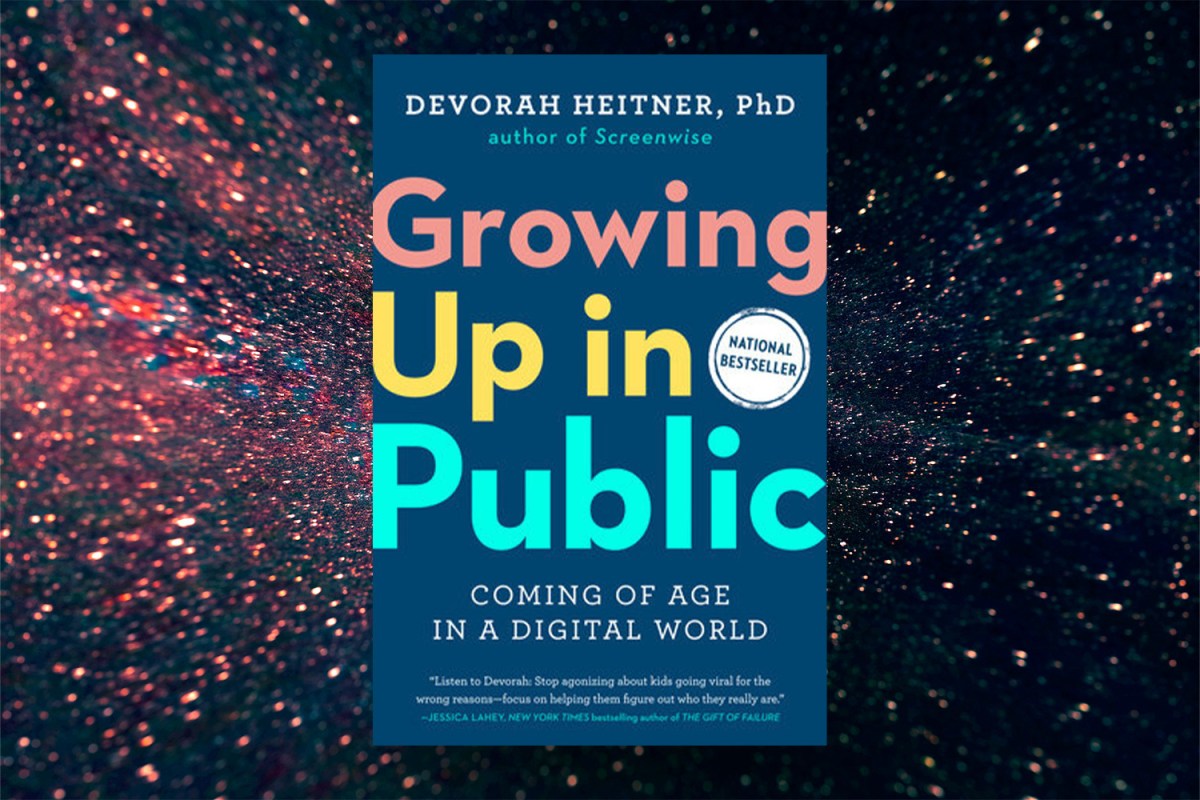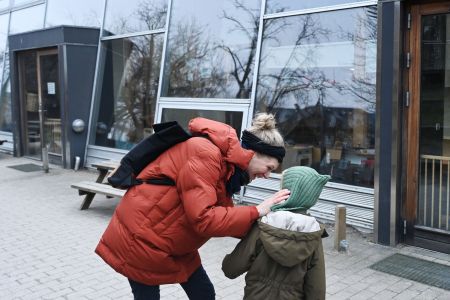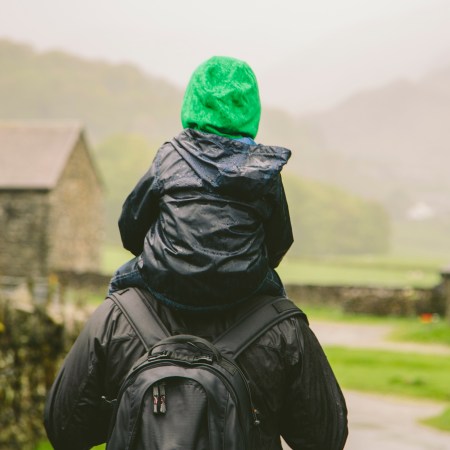It feels like an especially bleak time to be a kid. A few weeks ago, I came across a video captioned something to the effect of: “1990s party NO PHONES.” In the clip, teenagers are milling about, cracking jokes, cracking beers, causing trouble. As the caption implied, it’s fascinating (and even somewhat jarring) to see so many young people interacting eye-to-eye, none of them fishing to grab a phone from their pocket.
But I was struck even more by the incredulity in the comments section — the sheer despondency of Gen Z, as its constituents expressed their homesickness for a reality they never had.
This is an era of the “iPad stare” (when kids look up from their screens, there’s sometimes a dazed look in their eyes), of skyrocketing adolescent depression rates, of heartbreaking cyberbullying and sextortion scandals. Little wonder that some households have fully committed to parental control software. The monitoring melts into the physical world, too — with location-sharing apps, they can keep tabs on their children at all hours of the day, too.
For better or worse, that makes it a lot harder for kids to throw a 20th-century-style kegger. No wonder some of them want to ditch their phones completely. In a 2022 profile, The New York Times covered a group of Brooklyn high schoolers in the midst of a Dead Poets Society-style awakening. The self-described “Luddite Club” met on Sundays in Prospect Park, flip phones encouraged.
Is there any hope here? Are parents — especially young Millennial parents, who have a complicated relationship with phones and social media (grew up with it, but can vaguely remember the Before Times) — right to be panicking? What strategies, if any, can protect Generation Alpha from itself?
We recently caught up with Devorah Heitner, PhD, an advocate for ethical tech development, public speaker, parent of a teenager, and author of the best-selling Screenwise and the new book Growing Up in Public: Coming of Age in a Digital World. While acknowledging the delicate nature of the era we all find ourselves in, Heitner’s takes are relatively hopeful and extremely helpful.
Why Do Scandinavian Parents Leave Their Little Ones in the Cold?
Breaking down the puzzling rearing practice, which has been making the rounds on TikTokInsideHook: How would you characterize the challenges facing young people today compared to 15 years ago? How about 30 years ago?
Devorah Heitner: I think there’s increasing economic pressure and a sense that the economic models of independence and long-heralded adulthood are harder to attain (e.g., home-ownership). Kids have gone through potentially a more competitive, stressful experience getting into college, which leaves some of them burned out and exhausted. Social media, of course, is rife with comparison and sometimes competition. I think for many kids, it’s actually a pretty neutral factor in their life and it’s not making their life a lot better or a lot worse, but I think for some kids, it can be a lot to navigate and can add to the stresses of comparing ourselves with others or with feeling left out.
It’s been common in Millennial circles to hear the refrain: I’m not letting my kids use a smartphone before such and such date. Now that they’re parents, are they actually sticking to those proclamations?
Well, the research would say, “No.” We know that in many communities, kids are getting smartphones at 10 or 11, or they’re getting watches at that age. Certainly, by the end of middle school, by eighth grade, phones are almost universal, if not much sooner. So I think that parents who grew up with MySpace and some of the early social media and the early flip phones and various communication devices that were mobile, certainly may be more sensitive to some of the challenges that their kids will face and may hopefully lead into doing a good job of mentoring their kids on social media.
On emphasizing mentoring over monitoring, can you elaborate on some of the key strategies parents can use to mentor kids?
Parents should be curious about the apps kids are using and within those apps, especially with YouTube or TikTok, they should ask: What are the channels? Who are the influencers that kids are following? Who do they admire? What friends and family are they connecting with online? Do their kids feel safe in the online spaces that they’re in? Do they understand how to navigate a situation that doesn’t feel safe or appropriate? Do they have a sense of balance in their lives, between their online and in-person relationships? Those are some conversations that parents want to be having, over time, to make sure that kids have ways of figuring out who they are in the face of the pressures of the digital community.
What are some recommendations for balancing the need to keep children safe while respecting their autonomy and privacy?
Ideally, phones are not in the bedrooms of kids overnight. Kids are in a lot of conversations with parents when they first start out using a phone about who to be in contact with, what it means to have a contact, who you’re connecting with via text, social media, etc. Initially, ideally, those are people you know in real life as well; they’re just having a new way to contact someone as opposed to being in contact with a lot of people they don’t know over time. They may end up following celebrities or influencers or other channels, but make sure they’re aware that we don’t want to spend a lot of time in the company of/or following someone whose messages are negative or harmful. And try to make sure that kids know that you’re there for them, that they can talk to us. That’s the best antidote to feeling like we need to spy on them. So, being overtly in the conversation, versus covertly trying to catch our kids doing the wrong thing, letting them know they can talk to us and that there are other safe adults if they, for whatever reason, prefer that they don’t talk to us about a specific topic. Maybe there’s even another adult in their lives that they can feel safe with, or even a trusted older, young adult in their lives who they can talk to. That can be really helpful.
The Tradition That All Parents Should “Fiercely Protect”
An Aussie comedian on why you should take solo field trips with your kidsBased on research and expertise, what are the most effective ways parents can recognize and address instances of cyberbullying?
I think kids need to recognize when someone is violating their boundary, when someone isn’t taking no for an answer. [They can say] “Hey, you can’t call me that” or “That’s unacceptable.” Also, be really clear with your kids that they should never participate in harming another person, talking about another person in a harmful way or sending harmful verbal words/threats of physical violence to someone. If someone does that to them, it’s unacceptable, and they should know that they have legal rights and safety rights in the face of that. [It’s important] to talk with kids about this and ask them about it; a lot of kids have witnessed cyberbullying, even if they’re not directly being threatened themselves. A lot of kids have bystander trauma from witnessing cyberbullying.
We live in an era where social media metrics can really influence self-esteem. How can parents help their children navigate these challenges and maintain a healthy sense of self?
We need to really emphasize the reciprocity of friendship, as opposed to the sort of simplicity of followers. A friend is someone who shows up for you and you show up for them, and a follower is just the press of a button. A lot of the things people do to get followers aren’t necessarily desirable or in character for us. It really also emphasizes having a strong character and being the person you are and not trying to go for those numbers. Understanding that, of course, kids want to be seen and liked and regarded and they want that quantified on their social accounts. Also, the accounts are designed to get us where we’re the most human. We want to have empathy for kids’ desire to have those numbers, but also help them try to have a sense of humor and distance from that.
You offer insights into college admissions and applicants’ social media presences. What advice would you give to parents and students in preparing for the application process?
Definitely focus on just being yourself, putting your best foot forward in your applications, knowing that social media is unlikely to play a role in your admissions, whether positive or negative. Unless, there’s something really extraordinary either on the negative or the positive side — say, you’re an incredible activist and you’ve built an incredible YouTube following, or you’re saving an endangered species. That could help you get into college! Or you’ve done something really egregious online that you’re well-known for…that’s not going to help you get into college, obviously. That’s going to be a barrier. But for most kids, even a few posts where you use bad language, that’s not a level of problem that’s going to keep you out of college. It’s important to focus on being the best person you can and not causing harm online; not because of the threat of it around admissions, but simply because you shouldn’t want to harm people online. You don’t want to be contributing to a larger problem of bullying or bigotry or discrimination in our world. In other words, the reasons to be a good person online are not because you might not get into Princeton. The reason is, you don’t want to contribute to harm either against an individual or against a group of people. Too often when we emphasize the consequences about college, we’re giving kids the wrong message. We’re telling them, “Don’t get caught,” which is not a message I think any of us consciously would want to give our kids. It’s obviously a really problematic message around ethics.
The book also touches on the dangers of location sharing. What are the potential long-term impacts of these practices on privacy?
There are kids who never feel like they have the autonomy to be where they need to be, or make their own best decisions about how to spend their time, or how to safely extract themselves if there’s somewhere they’re not supposed to be. These kids might be less resilient in the face of something like getting lost, or getting on the wrong train. Kids need to actually have those experiences so that they can experience moving through the world with independence. They need to learn to trust their own resources, yet also know, “If I do need to ask someone for help, who is the kind of person I can ask for help?” Consider: If your kid is in another state, should they be calling you to ask for help? Or should they be asking a safe-looking person in the street, or a shop owner, or a police officer? We don’t want our kids so reliant on us that if you’re in a meeting and can’t take their call, they’re sort of stuck and have nowhere to go. It’s kind of sweet and funny to see kids call their parents in those situations, but in the end, we really want them to find other resources and also be able to make use of real-world, locally available help.
This interview has been condensed for length and clarity.
Whether you’re looking to get into shape, or just get out of a funk, The Charge has got you covered. Sign up for our new wellness newsletter today.
















